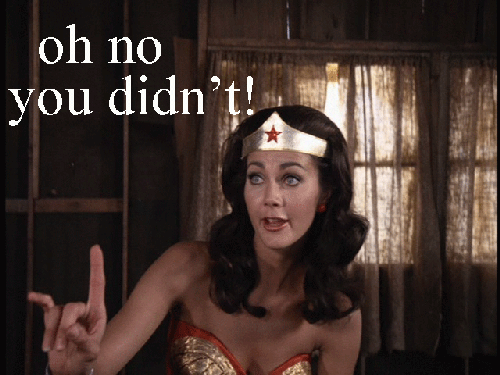Big RR wrote:Meade--I'll look up the Paul reference when I get a chance, but do you really want to quote Leviticus, which also tells us that we must kill witches ("Thou shalt not suffer a witch to live" (certainly you do not believe there is a class of persons who should be put to death for their beliefs, or even that magical witches exist, do you?) and presents a large other group of "laws" which must be followed (but are not today by most christians or jews)? As for Paul, I do not condemn Paul per se, just note that most modern commentators seeks to distinguish his pronouncements as to what are generally applicable and what are specific to the situation. Nothing wrong with that, but it does dilute the authority of all passages if some can be distinguished.
edit to add:
From Paul's 1st letter to the Corinthian, chapter 14: 34Let your women keep silence in the churches: for it is not permitted unto them to speak; but they are commanded to be under obedience as also saith the law. 35And if they will learn any thing, let them ask their husbands at home: for it is a shame for women to speak in the church.
Limited only to the church in Corinth as some have argued--no reason to say so based on the quote
Thanks for the reference - I had a feeling there was one but couldn't place it. In reverse order - Paul was certainly writing to the Corinthian churches. "Corinthians" is not singular nor is "church" for that matter since it refers to the body of believers who at the time did not meet in only one building but in believer's homes, more like the small cell groups in the Cell Church movement today, or even in different "church" buldings as we do today. Some church groups/denominations today regard Paul's instruction as applicable to all churches (i.e. to their own) and others believe they are applicable only to some churches (i.e. not their own). That is why some groups/denominations have female pastors (and higher) while others do not. Some with female pastors and higher do not permit female Elders. Almost all (or most) who have Deacons permit females since the Bible mentions "deaconesses" but that is not a teaching position.
On the logical ground that there are no witches (those who call themselves such are incapable of the mythological practises of witchcraft - flying on brooms, casting spells that work and so on) - I have no problem with putting such "witches" to death. There are none to be put to death. If someone does show up who kills babies, puts spells on people so that they get ill and die and actually fulfil the mythological powers of witchery (proven in a court of law) then death probably is too good anyway. Those who prance about meadows in New England states mumbling to the Winds of the East and West are no more witches than UFO nutters.
Please re-read about the "Law" and understand why Christians don't stone adulterers etc. All Christians know that Christ did not "change" the Law but superseded it, removing the penalty of Law (not the identity of sin). So yes, I have no problem at all in showing where the Bible identifies sin against God, not one of which Jesus declared to be "not sin".
It is so false to say that properly understanding when a thing is applicable generally or particularly dilutes the "authority of all passages". This is the classic error of those who want to cherry-pick what is true and what is false in the Bible (men seek out teachers who will teach what their itching ears want to hear (2Tim 4:3)). The authority remains unaltered.
Perhaps what you mean is that it indicates a need to better understand what the author intended by what he wrote (under the inspiration of God). That's the very basis of Biblical exegesis and you will not find any reputable student of the Bible to disagree with you. That's correct. But please tell me in what way the debate about women (did Paul mean all or just some churches?) has any effect at all on the authority of:
1 Cor 6:9-11 Do you not know that wrongdoers will not inherit the kingdom of God? Do not be deceived! Fornicators, idolaters, adulterers, male prostitutes, sodomites*, 10 thieves, the greedy, drunkards, revilers, robbers—none of these will inherit the kingdom of God. 11 And this is what some of you used to be. But you were washed, you were sanctified, you were justified in the name of the Lord Jesus Christ and in the Spirit of our God.
*variously translated as "nor those who make women of themselves", "no effiminate", "nor practising homosexuals (NABWRNT), "men who have sexual relations with other men", "homosexuals", "sexual perverts", etc.
Do you propose that Paul maybe meant only some fornicators, some adulterers, some homosexuals?
Do you think he maybe just meant in Corinth?
Or do you think he was perhaps just plain wrong about that? That people who glorify in those sins are in fact not sinning at all but just doing what they need for love and comfort? That Christians are quite free to worship false gods, commit adultery and etc etc because it doesn't matter what they do, God will just chuckle and pat them on the head later?
Or that he was right in the 1st century but all those things ceased to be sins somewhere around... 1970? 1983?
I think those bishops were right to get out of a church that contradicts the Bible. But wrong to join one that equally does so.
Meade
For Christianity, by identifying truth with faith, must teach-and, properly understood, does teach-that any interference with the truth is immoral. A Christian with faith has nothing to fear from the facts

